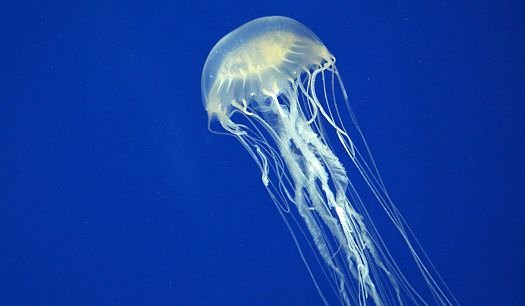jellyfish

Here are awesome facts about jellyfishJellyfish and jelly-like sea creatures come in an immensely diverse range of forms. Animals that are typically called jellyfish belong to the phylum Cnidaria, which includes over 10,000 species. However, some jelly-like animals, like the comb jelly , belong to the phylum Ctenophora. This taxonomic difficulty has lead marine biologists to ask if there's even
such a thing as a jellyfish .
Let's set those questions aside for now, and dive together into the fascinating world of creatures commonly known as jellyfish.
- Some jellyfish can glow in the dark
Many jellyfish have
bioluminescent organs, which emit light. This light may help them in a number of different ways, like attracting prey or distracting predators. - Jellyfish can clone themselves
If a jellyfish is cut in two, the pieces of the jellyfish can regenerate and create two new organisms. Similarly, if a jellyfish is injured, it may clone itself and potentially produce hundreds of offspring. - Some jellyfish are immortal
There are two phases to jelly life: the stationary polyp stage and the mobile medusa phase. It's the medusa phase that we're usually referring to when we talk about jellyfish. Typically, jellies start as polyps and develop into medusas, but the
Turritopsis nutricula has earned it the nickname "the immortal jellyfish" for having the ability to travel backward to the polyp stage in times of stress. - Jellyfish can teach us about efficient underwater propulsion
The movements of bell-shaped jellyfish have provided researchers with a new understanding of propulsion. The flexibility of their umbrella-like bodies allow them to pulse upwards and downwards without expending much energy. Researchers have created
biomimetic robots with flexible bells , which may one day lead to better undersea vehicles. - Not all jellies have tentacles
The scyphomedusa deepstaria, shown in the video below, doesn't need tentacles to trap its prey. - There's a giant jellyfish called the pink meanie
The scientific name for this jelly is Drymonema larsoni, but its aggressive sting and distinctive color have earned it the nickname " pink meanie ." - Jellyfish don't have brains
Instead, jellyfish have nerve nets which sense changes in the environment and coordinate the animal's responses. - Jellyfish movements inspired a new way to fly
It's probably not that surprising that jellyfish have served as inspiration for swimming robots. However, it's more unusual to see a sea creature inspire a flying machine , but that's just what happened at New York University. - Jellyfish powder has been used to make salted caramel
Turtles eat jellyfish, and larger jellies may eat smaller ones, but are jellyfish fit for human consumption? A group of high school students in Japan came up with a salted caramel recipe that uses powered jellyfish. It's not vegan for sure, but it is one way to deal with an invasive jellyfish bloom. - Glowing jellyfish goo could power medical devices
Another jellyfish-derived product takes advantage of the jellies' fluorescent protein, and could be used to power medical devices in the future. - Jellyfish are surprisingly good at shutting down nuclear reactors
In the past decade, jellyfish blooms have been responsible for shutting down several nuclear reactors, which often rely on ocean water intakes. The jellyfish swarms can clog the intake pipes, forcing facilities to stop operating temporarily. - Jellyfish will eat peanut butter
Peanut butter jellyfish! Need I say more?
Ok, I will: two Aquarists in Dallas, Texas created a saltwater/peanut butter mix and fed it to moon jellies. Apparently, the jellies found this mix to be an acceptable source of protein. "We would love to claim we conducted this trial with noble purpose, but the truth is that we just wanted to make peanut butter and jellyfish simply to see if it could be done," the researchers write . - Some jellyfish look like trash bags.
They're known as Deepstaria enigmatica, and are usually found in the Arctic seas. - Jellyfish might take over the ocean
You may have heard that jellyfish are taking over the world's oceans . However, there's actually a good deal of debate about this issue among scientists.
Still want to know more? I recommend JellyBiologist, the excellent blog by researcher Rebecca Helm.